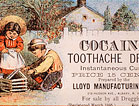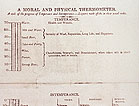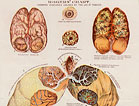Pick Your Poison presents these educational resources for K-12 educators and college/university faculty. The resources present selected themes or visual items from the online exhibition as a part of instructional materials or self-directed learning. Students examine the rich content and primary sources in the exhibition in developing content knowledge and higher order thinking skills. Educators are welcome to adapt these resources in whole or in part as they deem most appropriate for students’ interests and academic goals
LESSON PLANS
Drug Use and Abuse: Past and Present
Grade level: 10-12 | subject—health education, history and social studies
This lesson plan uses the historical case studies of five drugs—tobacco, alcohol, opiates, cocaine, and marijuana—featured in the online exhibition, Pick Your Poison: Intoxicating Pleasures and Medical Prescriptions. Students examine primary sources related to drug use and advertisement through 1800s and early 1900s, and identify three factors that influenced the use of those drug in the United States in the past. Students research contemporary information on the same drugs and compare their past use and current information that discourage young people from using/abusing the drugs. The lesson plan has been develop in collaboration with Lynn M. Wiegand who is a certified health education educator and school library media specialist in the Montgomery County, Maryland.
HIGHER EDUCATION
AMERICA’S MIND-ALTERING HISTORY
America’s Mind-Altering History is a module developed for undergraduate and graduate courses to accompany the National Library of Medicine exhibition Pick Your Poison—Intoxicating Pleasures and Medical Prescriptions. Sarah W. Tracy, Reach for Excellence Associate Professor of the History of Medicine at the University of Oklahoma in Norman, Oklahoma, authored the module.
SEEKING PLEASURE, MANAGING MOODS: Users’ Experiences with Psychoactive Drugs
Seeking Pleasure, Managing Moods examines how Americans have sought to benefit from the effects of drugs and control their bad effects from the Progressive Era through the twentieth century. It focuses most closely on the experiences of drug users themselves, using selected writings by historians and sociologists as well as writing from earlier periods by or about drug users. The module facilitates students’ thinking critically about and understanding the complexities in such issues as drug policy and the regulation of medicine. Caroline Jean Acker, Associate Professor and Head of the History Department at Carnegie Mellon University, authored this module.
ONLINE ACTIVITIES
“An Inquiry into the Effects of Spiritus Liquors on the Human Body. To Which is Added, a Moral and Physical Thermometer.”
Benjamin Rush, MD (1746–1813) was a noted physician and signer of the Declaration of Independent. He published this famous work where he introduced the “Moral and Physical Thermometer,” a chart showing the relationship between alcohol consumption, temperament and character, disease, and life circumstances. For more books authored by Benjamin Rush that have been digitized from the collection at the National Library of Medicine, visit the Digital Collections site.
OTHER RESOURCES
Access today’s health resources related to tobacco, alcohol, and other drugs. The resources have been gathered by Patricia E. Gallagher, National Information Center on Health Services Research and Health Care Technology at the National Library of Medicine.





